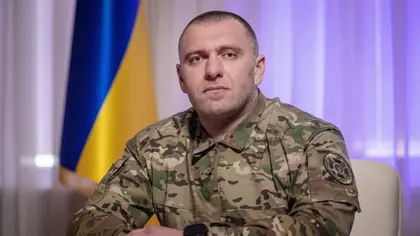An assassination campaign “possibly” run by Ukraine’s national spy agency, the Security Service of Ukraine (SBU), has killed more than a dozen Ukrainian citizens collaborating with the Kremlin in Russian-occupied territory, the agency’s senior officer, Lt. Gen. Vasyl Malyuk, said in Monday evening televised comments.
Speaking in an hour-long interview with the national broadcaster ICTV, Malyuk said secret operators since Russia’s February 2022 full-scale invasion have targeted “very many” individuals responsible for war crimes and attacks against Ukrainian citizens and operated deep behind “enemy” lines, including in Russia.
JOIN US ON TELEGRAM
Follow our coverage of the war on the @Kyivpost_official.
Kyiv Post could not independently confirm Malyuk’s claims in the interview or elsewhere related to these alleged operations.
Malyuk claimed that the assassination campaign, run through networks of secret agents and clandestine operatives, has prioritized Ukrainian nationals collaborating with Kremlin occupation authorities to arrest and torture other Ukrainians, but that formally, Kyiv cannot take responsibility for the killings and attempted killings.
“Officially, we will not admit to this,” he said. “But at the same time, I can offer some details.”
Following the interview, a Moscow court issued a warrant for Malyuk’s arrest on Tuesday on suspicion of participating in “terrorist acts” in violation of Russian Federation law.

‘We Need to End That Horrible, Horrible War’ – Ukraine at War Update for Dec. 23
In the interview, Malyuk offered details of multiple Ukraine state-sponsored killings and of purported internal Ukrainian government processes authorizing them.
Malyuk claimed the process goes as follows: Before planning and executing an assassination, SBU leadership cooperates with national-level law enforcement and intelligence agencies to identify the target and confirm he or she was responsible for wartime activities calculated to kill or injure Ukrainians. He said that civilian authorities give any sanction to the SBU to assassinate only after due deliberation of intelligence.
Malyuk said Ukraine-born Vladlen Tatarsky, a Kremlin propagandist and media personality, was targeted because of his military service fighting against the Ukrainian military in 2014-16, and continued high-profile calls for elimination of Ukrainians as a nation, by state-sponsored genocide, if necessary, up to his death. An explosive-filled statuette killed Tatarsky in a St. Petersburg café on April 2, 2023. Operatives duped an intermediary, a young woman, into handing the statue to Tatarsky, Malyuk said.
The SBU would not take credit for the execution but Tatarsky deserved it because of repeated abuse of Ukrainian prisoners of war for Kremlin propaganda, he said. The woman with the statue, Darya Trepova, was sentenced to 27 years imprisonment in a Moscow court on Jan. 25. She said she was tricked into giving Tatarsky the explosives-filled statue.
Vasyl Malyuk, head of Ukraine’s national spy agency the SBU, poses with a service dog. Image published by the rn.ua news agency on 21 Feb. 2024.
Former Ukrainian parliament member Illia Kyva, an outspoken critic of Ukrainian independence and a fugitive from Kyiv authorities following Russia’s main force invasion of Ukraine, was shot dead by an assassin in a village west of Moscow, on Dec. 6, 2023. Kyva had been convicted of treason and was continuing anti-Ukrainian activities in cooperation with Russia’s national spy agency the FSB, and was executed by a pair of 9mm pistol shots at close range by a skilled assassin, Malyuk said.
Ukrainian citizen Zakhar Prelepin, a senior police official in a “separatist” government supported by the Kremlin in Ukraine’s eastern Luhansk region, was “a target” because he had served at the top levels of Ukrainian law enforcement before turning coat, and went on to call publicly for the murder of Ukrainians and a systematic police effort to carry out the killings, Mayuk claimed.
Prelepin survived the Sep. 16, 2022 detonation of an anti-tank mine killing several other police gathered at a country house in the Luhansk region, but severe injuries to his midsection destroyed his genitalia and left “this proved war criminal” an invalid, Malyuk claimed. Some media at the time reported Prelipin died in the attack.
An 800-gram NATO-standard C-4 explosive charge was used to blow up the office of the Prosecutor General of the Luhansk occupation authority “LPR,” following Gorenko’s active prosecution of Ukrainian citizens for Kremlin officials running the region, and obtaining execution sentences against Ukrainian soldiers and civilians, Malyuk said. Some media at the time reported an anti-armor rocket had been fired through Gorenko’s office window.
Igor Kornet, the senior LPR police officer, was likewise severely injured and left an immobile invalid following a bomb blast on May 15, 2023 hitting a Luhansk barber shop. Kornet visited the establishment once a week, Malyuk claimed.
The number of targeted killings against such officials collaborating with invading Russian troops is substantial and more are likely to take place, he said.
Malyuk said one of the highest-profile assassination attempts was against Russian political philosopher and close Vladimir Putin ally Aleksandr Dugin. It failed when the Kremlin propagandist switched cars with his daughter on Aug. 20, 2022, who was killed in a bomb rigged by agents, he said.
Aside from assassinations and intelligence collection, Malyuk said, SBU operators are running an ongoing campaign targeting Russian oil refineries using long-range kamikaze drones. The attacks began in earnest in early 2024 have hit all 15 oil refineries in European Russia and in some 10 weeks of attacks cut Russian national petroleum product production by 12 percent, and forced the Kremlin to declare a total ban on gasoline exports effective March 1, the intelligence agency head said.
Operators from the Ukrainian military are assisting in the oil refinery attacks inside Russia, Malyuk said.
Ukrainian military planners believe Kyiv is currently capable of attacking and destroying the strategically critical Kerch bridge connecting Russian-occupied Crimea with the Russian Federation. Railroad transport capacity of the bridge, severely damaged in a spectacular Oct. 8, 2022 truck bomb attack, has never been fully repaired, preventing movement by military freight cars and making the link a lower-priority target, Malyuk said.
“When they [Russian repair workers] fix the carrying capacity, that’s when we will send them, so to say, another ‘greeting card,’” he said.
SBU operator observes a kamikaze Sea Baby robot boat similar to ones used by Ukraine’s national spy agency in high seas attacks against warships belonging to Russia’s Black Sea Fleet. According to SBU director Vasyl Malyuk, SBU-operated attack boats have hit and damaged at least 11 major Russian warships. Official SBU photograph, undated.
An SBU-led campaign to attack the Russian Navy with kamikaze robot boats carrying explosives, launched in early 2023, has hit 11 Black Sea Fleet (BSF) warships operating in the central and western Black Sea, and forced Moscow to shift surviving vessels out of the major naval base Sevastopol to bases on the Russian coast, Malyuk said. SBU strikes can reach the new bases and will continue, he added.
You can also highlight the text and press Ctrl + Enter








